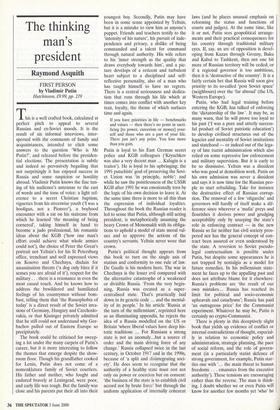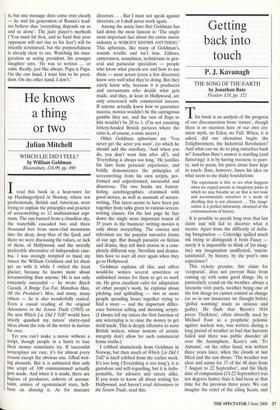The thinking man's president
Raymond Asquith
FIRST PERSON by Vladimir Patin Hutchinson, £9.99, pp. 219 This is a well crafted book, calculated at perfect pitch to appeal to several Russian and ex-Soviet moods. It is the result of six informal interviews, inter- spersed with the comments of family and acquaintances, intended to elicit some answers to the question `Who is Mr Putin?°, and released before the presiden- tial elections. The presentation is subtle and indeed so pervasively beguiling that not surprisingly it has enjoyed success in Russia and some suspicion or hostility abroad. Vladimir Putin knows the fine tun- ing of his audience's antennae to the cast of words and the tone of voice: a light ref- erence to a secret Christian baptism, vignettes from his streetwise youth CI was a hooligan, not a Pioneer'), a boyhood encounter with a rat on his staircase from which he learned 'the meaning of being cornered', taking himself in hand to become a judo professional, his romantic ideas about the KGB Chow one man's effort could achieve what whole armies could not'), the choice of Peter the Great's portrait not Yeltsin's for his St Petersburg office, trenchant and well expressed views on Kosovo and Chechnya, disdain for assassination threats Ca dog only bites if it senses you are afraid of it'), respect for the military ... there is a resonance in even the most casual touch. And he knows how to address the bewildered and humiliated feelings of his countrymen without bom- bast, telling them that 'the Russophobia of today' is a direct result of the Soviet inva- sions of Germany, Hungary and Czechoslo- vakia, or that Kissinger privately admitted that he still could not understand why Gor- bachov pulled out of Eastern Europe so precipitately.
The book could be criticised for sweep- ing a lot under the many carpets of Putin's career, but it is more interesting to follow the themes that emerge despite the show- room floor. Though his grandfather cooked for Lenin, Putin does not come of a nomenklatura family of Soviet courtiers. His father and mother, who fought and endured bravely at Leningrad, were poor, and early life was tough. But the family was close and his parents put their all into their youngest boy. Secondly, Putin may have been in some sense appointed by Yeltsin, but it is a mistake to view him as anyone's puppet. Friends and teachers testify to the `intensity of his nature', his pursuit of inde- pendence and privacy, a dislike of being commanded and a talent for command through, natural authority. His wife refers to his 'inner strength as the quality that draws everybody towards him', and a pic- ture develops of a reticent and turbulent heart subject to a disciplined and self- reflective personality, also of a man who has taught himself to have no regrets. There is a central seriousness and dedica- tion that runs through his life which at times comes into conflict with another key trait, loyalty, the theme of which surfaces time and again.
If you have priorities in life — benchmarks and values — then there's no point in sacri- ficing [to power, careerism or money] your- self and those who are a part of your life. There just isn't any point. You lose more than you gain.
Putin is loyal to his East German secret police and KGB colleagues (‘Kryuchkov was also a very decent man ... Kalugin is a traitor'). He is loyal to his upbringing: the 1991 putschists' goal of preserving the Sovi- et Union was 'in principle, noble'; and while he saw the pointlessness of the USSR KGB after 1991 he was emotionally torn by the logic of his own decision to leave it. At the same time there is more to all this than the expression of individual loyalties. Throughout the book the Russian reader is led to sense that Putin, although still acting president, is metaphorically assuming the heavy Crown of Monomakh with its obliga- tions to uphold a model of state moral val- ues and to approve the actions of the country's servants. Yeltsin never wore that crown.
Putin's political thought appears from this book to turn on the single axis of statism and conformity to one rule of law. De Gaulle is his modern hero. The war in Chechnya is the lesser evil compared with the alternative catastrophe of a weakened or divisible Russia. 'From the very begin- ning, Russia was created as a super- centralised state. That's practically laid down in its genetic code ... and the mental- ity of its people.' In his article 'Russia at the turn of the millennium', reprinted here as an illuminating appendix, he rejects the idea of a Russia modelled on the US or Britain 'where liberal values have deep his- toric traditions ... For Russians a strong state is not an anomaly...but a source of order and the main driving force of any change.' Russia collapsed twice in the last century, in October 1917 and in the 1990s, because of 'a split and disintegrating soci- ety'. He does seem to recognise that the authority of a healthy state must rest not only on power or coercion but on consent: `the business of the state is to establish civil accord not by brute force' but through the uniform application of internally coherent
laws (and he places unusual emphasis on reforming the status and functions of courts and judges). At the same time, like it or not, Putin sees geopolitical arrange- ments and their practical consequences for his country through traditional military eyes. If, say, an arc of opposition is devel- oping from Kazan through Grozny, Baku and Kabul to Tashkent, then not one bit more of Russian territory will be ceded; or if a regional governor is too ambitious, then it is 'destructive of the country'. It is a fairly certain bet that Russia will soon give priority to its so-called 'post Soviet space' (neighbours) over the 'far abroad' (the US, Western Europe).
Putin, who had legal training before entering the KGB, has talked of enforcing the 'dictatorship of the law '. It may be, as many warn, that he will prove too loyal to his past CI was a pure and utterly success- ful product of Soviet patriotic education') to develop civilised structures out of the legacies and mentality of Soviet institutions and statehood — or indeed out of the lega- cy of late tsarist administration which also relied on some repressive law enforcement and military supervision. But it is early to be so dismissive. Yeltsin was a dissident who was good at demolition work. Putin on his own admission was never a dissident and says it is now time for the Russian peo- ple to start rebuilding. Take for instance the destructive effect of Russian corrup- tion. The removal of a few `oligarchs' and governors will hardly of itself make a dif- ference since wherever a `mafia' preys and flourishes it derives power and grudging acceptability only by usurping the state's role in enforcing contract — in the new Russia so far neither has civil society pros- pered nor has the general concept of con- tract been assured or even understood by the state. A reversion to Soviet pseudo- legal contractualism is possible under Putin, but despite some appearances he is not trapped by nostalgia as a model for future remedies. In his millennium state- ment he faces up to the appalling past and does not attribute blame for it elsewhere: Russia's problems are 'the result of our own mistakes... Russia has reached its limit for political and socio-economic upheavals and cataclysms'; Russia has paid `an outrageous price' for the Communist experiment. Whatever he may be, Putin is certainly no crypto-Communist.
There is plenty in this deceptively slight book that yields up evidence of conflict or internal contradictions of thought, especial- ly in relation to economic policy and administration, strategic planning, the pace of social reform, and the role of govern- ment (in a particularly statist defence of strong government, for example, Putin star- tles one with the main threat to human freedoms . . . emanates from the executive authority'). These tensions are encouraging rather than the reverse. The man is think- ing. I doubt whether we or even Putin will know for another few months yet 'who' he is, but one message does come over clearly — he and his generation of Russia's lead- ers believe that 'everything depends on us and us alone'. The judo player's methods (You must hit first, and so hard that your opponent will not rise to his feet') will be intently scrutinised, but the purposefulness is already clear to see. Watching his inau- guration as acting president, his younger daughter says, `He was so serious ... or calm. Really, just like always. Papa is Papa. On the one hand, I want him to be presi- dent. On the other hand, I don't.'






































































 Previous page
Previous page